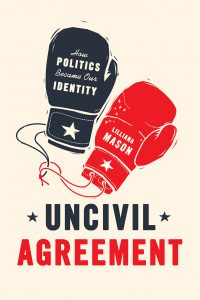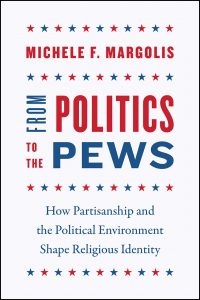Understanding American politics today: identity, the triumph of the national over the local, and the triumph of politics over all else



The surprising outcome of the 2016 presidential election led to a good bit of soul-searching among America’s political pundit class. How could they have gotten things so wrong?
The earliest attempts to understand latched onto story and anecdote, as books like J. D. Vance’s Hillbilly Elegy were picked apart for their purported insights into the voters who elected Donald Trump.
Nearly two years out, it’s clear that more rigorous analysis is likely to prove much more fruitful. And a trio of Chicago books are getting their due, hailed for their insights into the forces driving American politics today. Each offers a piece of the whole, and together, they build a picture of a nation deeply divided, though perhaps not in exactly the ways, or for the reasons, we think.
Daniel Hopkins’s The Increasingly United States: How and Why American Political Behavior Nationalized lays the groundwork for understanding why our relationship with our local representatives, and the issues they’ve historically been most responsive to, has changed. All politics may once have been local, but that’s no longer the case. As an article in the New Yorker explained:
Voters pay vastly more attention to what is going on in Washington, D.C., than to what’s going on in their own town or state. The Democratic and the Republican Parties have become much more homogeneous, offering largely the same ideological profile in Alabama as they do in Vermont. In each election, Americans now face a choice between two clearly demarcated alternatives of action.
The cost? The ability of representatives to hold a range of positions that is diverse and not fully beholden to the party line, and, consequently, of their ability to deal effectively with local problems.
That nationalization of politics is exacerbated by another trend: that of politics slowly subsuming all other markers of group identity. As Lilliana Mason explains in Uncivil Agreement: How Politics Became Our Identity, our differences along racial, religious, and cultural lines have recently come to also divide neatly between the two major political parties. She argues that group identifications have changed the way we think and feel about ourselves and our opponents. The same New Yorker article details the dismaying effects:
Factors such as class, race, religion, gender, and sexuality used to cut across one another to a significant extent. In an earlier age, a voter might have identified herself as both a conservative and a Presbyterian. Each of these identities predisposed her to have a negative opinion of people who did not belong to the same group. But since there were plenty of non-Presbyterian conservatives, as well as plenty of non-conservative Presbyterians, each of these “cleavages” held the other one in check.
To top it all off, it turns out that markers of our identity—like religious belief—that we have long thought preceded political affiliations, and thus helped to determine them, may themselves be the effects of our political affiliations. In From Politics to the Pews: How Partisanship and the Political Environment Shape Religious Identity, Michele F. Margolis shows that, far more often than we’ve previously thought, the question of whether a person chooses to identify as religious and the extent of their involvement in a religious community are at least partly a response to political surroundings. In a New York Times op-ed, Margolis laid out the potential consequences of such a shift for our democracy:
Unfortunately, all of this is bad news for our political future. Other researchers have found that hearing diverse political messages promotes tolerance, interacting in politically integrated social settings curbs partisan biases, and having key social groups represented in both political parties helps maintain civil political discourse. Churches used to facilitate this, uniting people with diverse political opinions.
But when politics affects whether and where Americans go to church, even our houses of worship become political echo chambers. Americans will increasingly find themselves able to bitterly denounce or unflinchingly laud Donald Trump, to a chorus of agreement. In the end, this will further divide us.
We can’t figure out how to bridge America’s political divides until we understand what’s driving them. These books are a start.